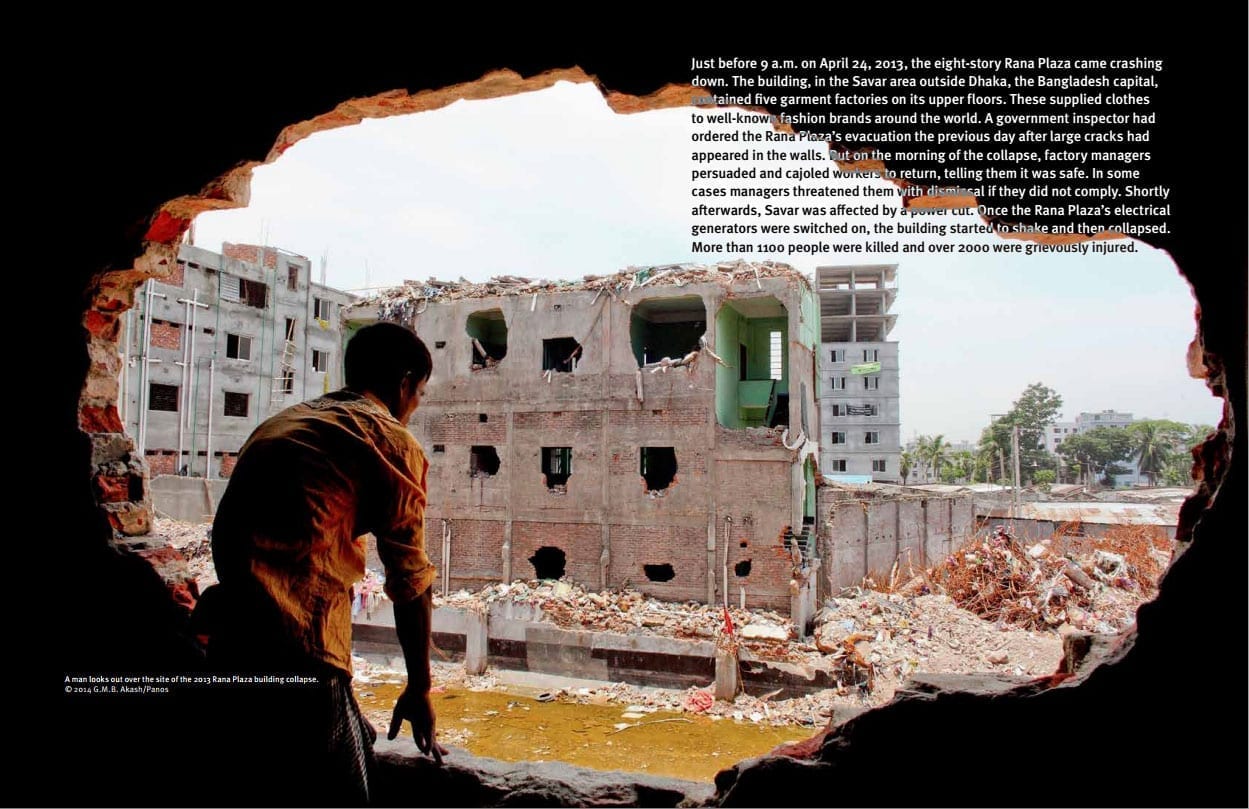
Apr 20, 2015
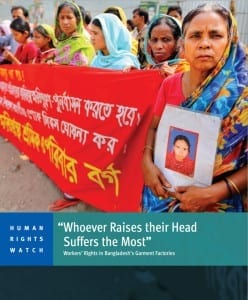
Bangladesh garment workers often risk their health and their lives at unsafe factories, and when they seek to form unions to address workplace problems, “factory managers continue to use threats, violent attacks and involuntary dismissals in efforts to stop unions from being registered,” according to a Human Rights Watch report released today.
“I was beaten with metal curtain rods in February when I was pregnant,” one garment worker told HRW. “They wanted to force me to sign on a blank piece of paper, and when I refused, that was when they started beating me. They were threatening me, saying, ‘You need to stop doing the union activities in the factory, why did you try and form the union.’”
Her experience was not unique, according to “Whoever Raises Their Head Suffers the Most: Workers’ Rights in Bangladesh’s Garment Factories.” HRW also has released a video with garment workers describing the attacks they face when they try to form unions.
Two years after the deadly Rana Plaza collapse that killed more than 1,130 garment workers, the report finds that despite international outrage over the series of mass fatalities at Bangladesh garment factories in recent years, garment workers take great personal risk when trying to improve workplace conditions.
In providing an in-depth look at the experiences of more than 160 workers from 44 factories, the report concludes that “the primary responsibility for protecting the rights of workers rests with the Bangladesh government.
“The poor and abusive working conditions in Bangladesh’s garment factories are not simply the work of a few rogue factory owners willing to break the law. They are the product of continuing government failures to enforce labor rights, hold violators accountable and ensure that affected workers have access to appropriate remedies.”
Rigorous enforcement of existing law would go a long way toward ending impunity for employers who harass and intimidate both workers and local trade unionists seeking to exercise their right to organize and collectively bargain, according to the report.
“If Bangladesh wants to avoid another Rana Plaza disaster, it needs to effectively enforce its labor law and ensure that garment workers enjoy the right to voice their concerns about safety and working conditions without fear of retaliation or dismissal,” says Phil Robertson, HRW’s Asia deputy director.
The report also notes the lack of full financing for the Rana Plaza compensation fund, stating that it “should not be seen as a success or a model unless and until it is replenished and full compensation is paid to claimants.”
Among the report’s recommendations:
- The Bangladesh government should carry out effective and impartial investigations into all workers’ allegations of mistreatment, including beatings, threats and other abuses, and prosecute those responsible.
- The Bangladesh government should revise its labor law to ensure it is in line with international labor standards.
- Companies sourcing from Bangladesh factories should institute regular factory inspections to ensure that factories comply with companies’ codes of conduct and Bangladesh labor law.

Apr 17, 2015
Some 30 global unions, corporations and nonprofit networks are urging the U.S. State Department to ensure its upcoming Global Trafficking in Persons report accurately reflect the serious, ongoing and government-sponsored forced labor in Turkmenistan and Uzbekistan.
“The Uzbek government continues to operate one of the largest state-orchestrated systems of forced labor in the world,” according to letters sent today by the organizations, which include the Solidarity Center, the AFL-CIO, AFT and the Australian Council of Trade Unions. (Read the letters here and here.)
In Turkmenistan, as in Uzbekistan, the government’s “mass mobilization of citizens to harvest cotton degraded public services, especially schools, which sent their teachers to pick cotton,” according to the organizations. “Some officials also forced civil servants to clean and landscape public spaces and to clean the officials’ homes.”
In its 2014 report, the State Department ranked Uzbekistan as “Tier 3,” a designation that means it does not fully comply with the minimum standards set by the U.S. Trafficking Victims and Protection Act (TVPA) and is not making significant efforts to do so. Turkmenistan was ranked on the Tier 2 Watch List, meaning its government does not fully comply with the TVPA standards but is making significant efforts to become compliant.
The organizations are urging the State Department to maintain Uzbekistan’s Tier 3 status and downgrade Turkmenistan to Tier 3. Key to the Tier 3 designation is the extent to which a country serves as origin, transit or destination for severe forms of trafficking and the extent to which officials or government employees are complicit in severe forms of trafficking.
The Trafficking in Persons report “is an important means to shine light on modern-day slavery and to press governments to do more to eradicate it,” the organizations state. Maintaining the Tier 3 ranking not only accurately reflects the reality on the ground, they say, but will help press the governments to take meaningful steps to end forced labor. The letters were sent to U.S. Secretary of State John Kerry and Ambassador Patricia Butenis, acting director of the State Department’s Office to Monitor and Combat Trafficking in Persons.
A report released this month found that extortion and bribery fueled the forced labor behind Uzbekistan’s cotton harvest in autumn 2014, a coerced mass mobilization that took teachers, health care workers and millions of other employees away from their duties for several weeks.
In Turkmenistan, tens of thousands of teachers, doctors and other public employees were forced, under the threat of dismissal, to spend four months in the cotton fields, according to a 2014 report by Alternative Turkmenistan News. “The working and living conditions of the forced laborers were abysmal, with people often having to sleep in the open air, drink ditch water and bathe in irrigation channels.”
The U.S. Trafficking in Persons report, issued annually for the past 14 years, covers 188 countries and was mandated by the 2000 Trafficking Victims and Protection Act. The act sets standards to eliminate trafficking and creates enforcement measures, such as the withholding or withdrawal of U.S. non-humanitarian and non-trade-related assistance for countries with low rankings.
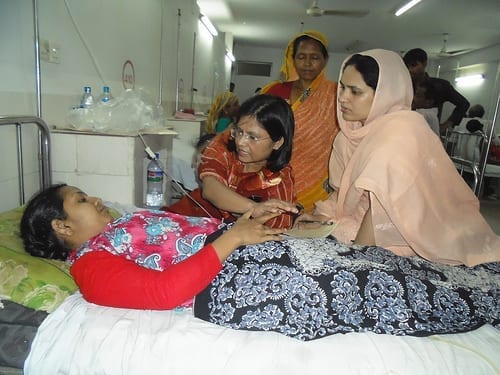
Apr 16, 2015
In the hours and days after the multistory Rana Plaza building collapsed in 2013, killing more than 1,100 garment workers in Bangladesh, Solidarity Center Senior Program Officer Lily Gomes was an ever-present figure in the hospitals, where she went from bed to bed checking on injured workers and offering support. She also visited workers at their homes, to offer assistance and to document details of the world’s deadliest garment factory disaster.
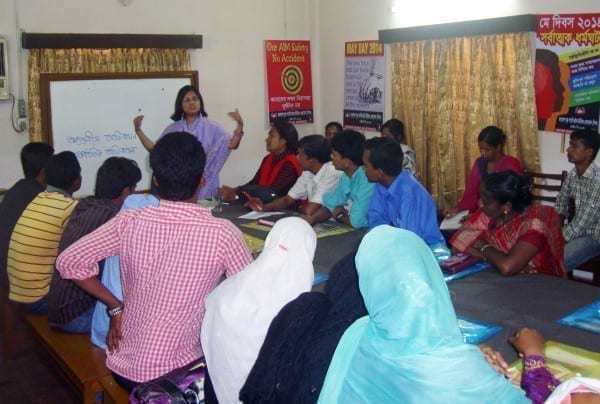
Lily Gomes has conducted hundreds of trainings for Bangladesh garment workers. Credit: Solidarity Center
Providing emergency aid is one of a multitude of duties Gomes has undertaken since joining the Solidarity Center’s Dhaka office in 1996. Trainer, union organizer, curriculum developer, gender specialist and financial program monitor—over the years, Gomes has carried out these roles and many more, earning a doctorate in sociology from Jadavpur University in India along the way. Now, she has a new title: Fellow at the National Endowment for Democracy in Washington, D.C.
“This is the time clearly to focus on women garment workers to have them in leading positions,” Gomes says of her plans while in residence. During her five month-long Reagan-Fascell fellowship, she will develop a gender policy guideline for advancing women’s leadership among trade unions within Bangladesh’s ready-made garment (RMG) industry. “This is the time for women to express their voices.”
She brings to the fellowship a rare range and depth of experience. Gomes was among Solidarity Center staff aiding garment workers forming their first women-led union in 1996. “I was with them day and night,” she says, recounting the long hours involved in creating the Bangladesh Independent Garment Workers Union Federation (BIGUF), a milestone achievement not only for worker rights but one that “initiated the idea that women should be the main leadership to reflect the workers in the RMG industry in Bangladesh.”
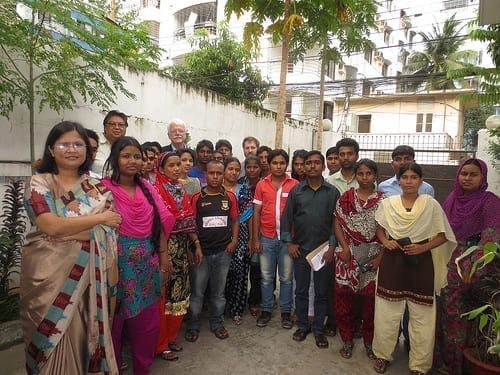
Lily Gomes (front, left) and Bangladesh garment workers met with then-U.S. Rep. George Miller in 2013 about factory working conditions. Credit: Solidarity Center
In those years, child labor was rampant, and Gomes describes how factory owners would hide children in boxes or even toilets when inspectors arrived. Passage of the Child Labor Deterrence Act of 1999, long championed by former Sen. Tom Harkin, “was a huge thing for Bangladesh that assisted in complete elimination of child labor from the sector at the time,” Gomes says. The bill bans the importation to the United States of products that are manufactured or mined with child labor.
Following the law’s passage, Gomes helped the Solidarity Center set up and run schools for former child laborers “with a unique curriculum to address their needs,” a project that continued through 2002.
“The children were happy,” Gomes recalls. “They started relaxing. They learned not only academics but social issues,” including health and hygiene.
Gomes was coordinator of Solidarity Center-sponsored health clinics offering primary medical care for garment workers and their families. Over the years, she has provided workers with training sessions on topics as varied as labor law, financial management and collective bargaining negotiations. She also conducts fire safety training, a program the Solidarity Center pioneered for garment factory workers in 2000. In addition to helping garment workers unionize, she has assisted shrimp workers to organize and exercise their rights in seafood processing factories in southwestern Bangladesh.
Now, much of her focus is on empowering women garment workers to take on leadership roles and understand their rights to better advocate for themselves and their families. Although women comprise more than 90 percent of garment factory workers, during negotiations at unionized plants, “Women’s issues are sidelined in negotiations,” Gomes says.
“For instance, like ensuring contract language that includes breaks for breast-feeding and special care for pregnant women.” Women also have less access to better paying jobs and supervisory positions, outcomes generated by “socially built gender discrimination.”
In 2000, Gomes administered four Solidarity Center-sponsored Working Women Education Centers, where lawyers trained female factory workers on their rights regarding sexual harassment at the workplace, family leave and other issues important to women. Since then, she has reached hundreds of women workers through trainings on women’s labor rights and gender equality.
“Now, many of these Solidarity Center-trained women are leaders of other union federations,” Gomes says. “It’s a great feeling to know I trained them.”
In the late 2000s, she commuted for several years to India’s West Bengal state, to work on her Ph.D., which focused on the impact of employment and earning opportunities on female workers in Bangladesh’s RMG sector.
Beyond her organizational skills, educational background and talent for expertly taking on a broad range of tasks, Gomes brings to her work a compassion and deep understanding of humanity that sets her apart.
Recalling the hours after the Rana Plaza disaster, she describes visiting a school where bodies, nearly all young women, were laid out in row after row.
“I touched their hands and feet,” she said, “and felt like they were my sisters.”
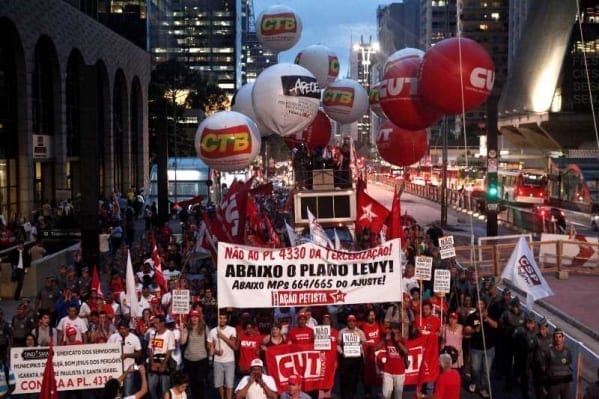
Apr 15, 2015
Brazil lawmakers have postponed a vote on a bill that would expand job outsourcing after a series of union-led protests drew tens of thousands of workers to streets across the country. The law would allow public and private employers to contract out all jobs, enabling employers to replace workers who have direct employment contracts with employees who could be paid up to 25 percent less. Some 12 million Brazilians already are employed as outsourced contractors, principally in cleaning and security services.
The Central Unica dos Trabalhadores (CUT), Central dos Trabalhadores e Trabalhadoras do Brasil (CTB), Intersindical, CONLUTAS and other unions spearheaded two national days of protest against the bill, most recently on April 15, when unions led peaceful protests in the capitals of all 27 Brazilian states. In São Paulo, more than 10,000 participants, including housing activists and student groups, temporarily stopped traffic on the city’s main roads. Uniao Geral dos Trabalhadores (UGT) also recently joined the coalition opposing the bill.
During similar protests on April 7, military police in Brasilia, the capital, blocked union members from entering the spectators’ gallery of the Congress, detaining four people and injuring eight others, according to the global union IndustriALL.
Under the bill, PL 4330, companies that contract outsourced services would not be directly responsible for any violations of outsourced workers’ labor rights. It also would allow outsourced workers to be represented by outsourced workers unions, and not by the unions that represent the directly-contracted workers at the companies where they are employed.
Lawmakers are expected to take up the bill next week.
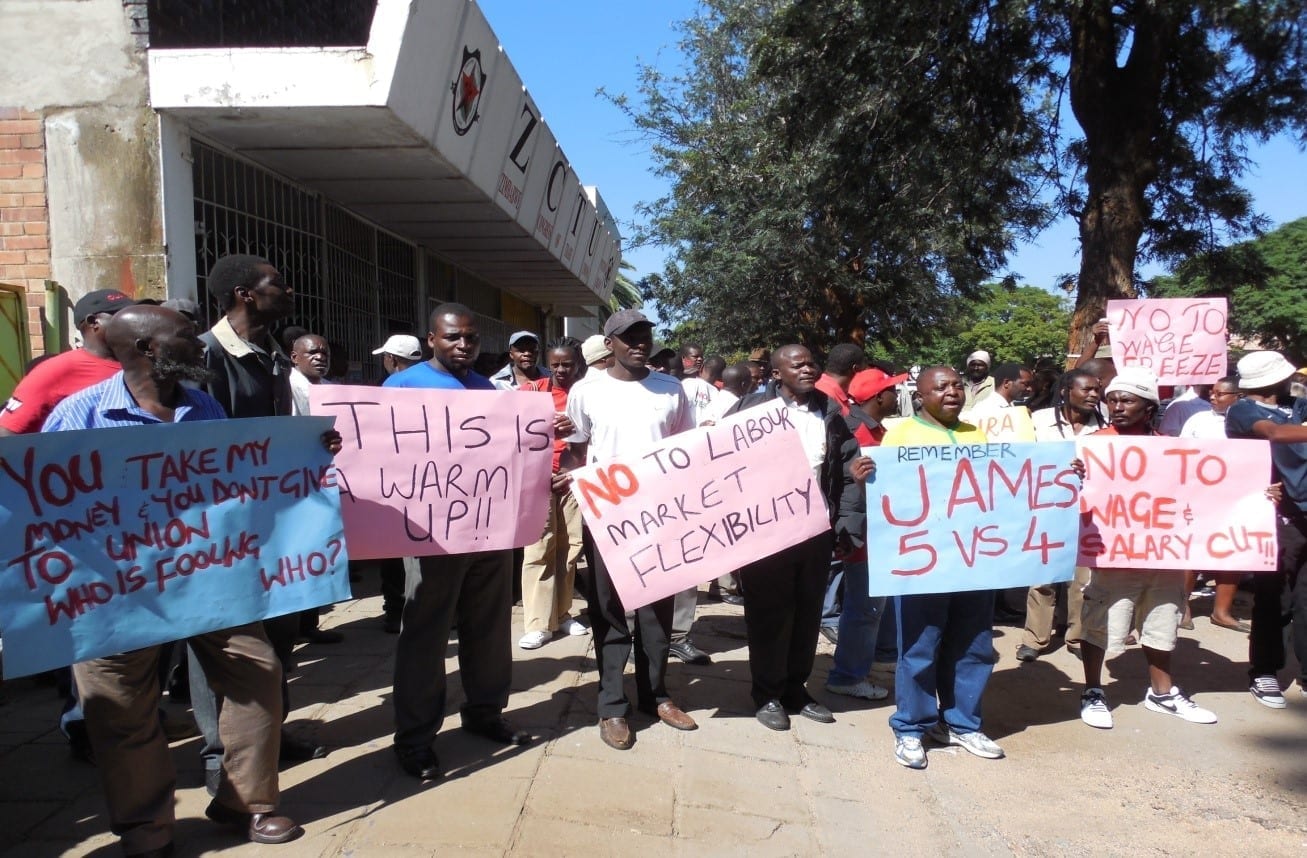
Apr 13, 2015
Fed up with unpaid wages, salaries that are below the poverty line, few jobs available in the formal sector and a proposed wage freeze, Zimbabwe workers took to the streets in six cities Saturday to demand workers be paid and to petition the government to not arbitrarily change the labor law to empower employers to fire workers.
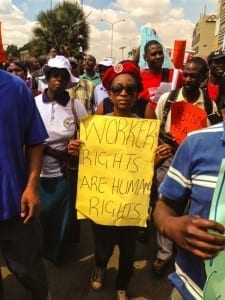
Workers rallied in cities across Zimbabwe Saturday. Credit: Thando Khoza
Carrying signs reading “Worker rights are human rights,” and “This year, we are not backing down,” workers presented government officials with a petition demanding officials honor their pledge to create 2 million jobs and rethink the introduction of so-called labor market flexibility, in which the brunt of economic reform falls on workers. (Read the full petition.)
“Senior government officials, including the minister of finance, want to turn the worker into a form of cheap labor,” Zimbabwe Congress of Trade Unions (ZCTU) President George Nkiwane said at the rally. “While it is the ordinary worker that is being made to suffer, the government is not taking any meaningful action on chief executives who are bleeding the economy by paying themselves huge salaries and perks.”
Wages average less than $250 a month—for the 30 percent of the population working in the formal economy—while the cost of living is as high as in New York City. Some 72 percent of the population lived below the poverty line in 2013. Increasing numbers of Zimbabweans are forced to seek a living in informal economy jobs like street vending, in which they have no income security and few, if any, social benefits like health care.
“We used to have over 1.5 million workers in the formal sector 10 years ago, but we would be lucky if we have 700,000 in the formal sector (today),” Nkiwane said.
Women are disproportionately represented in poor-paying informal economy jobs, and young workers in urban areas also lack jobs that pay a living wage, the ZCTU petition noted. Employers also increasingly subcontract dangerous jobs, and so avoid paying compensation to workers injured or made ill while on the job, the petition stated.
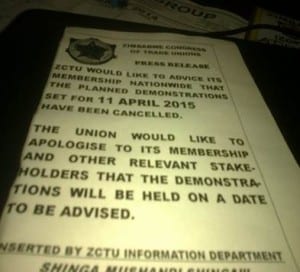
Fake press releases and pamphlets were distributed in advance of the rally, falsely stating the rallies had been cancelled. Credit: ZCTU
Protestors turned out in Bulawayo, Chinhoyi, Gweru, Harare, Masvingo and Mutare despite a campaign to fool workers into thinking the rally had been cancelled. Fake press releases and pamphlets, purportedly from ZCTU, were distributed in several cities in advance of the rally, telling workers it had been canceled.
The march took place in an increasingly threatening environment for activists. Last month, Itai Dzamara, a leading pro-democracy advocate, was abducted. He remains missing, and leading civil society organizations—including the ZCTU—are calling on the government to ascertain his whereabouts and prosecute his abductors.
Police in the cities of Bulawayo, Mutare and Masvingo initially refused to grant permission for the demonstrations, but reversed their decisions after the Harare police agreed to allow the demonstration there, according to the International Trade Union Confederation (ITUC).










